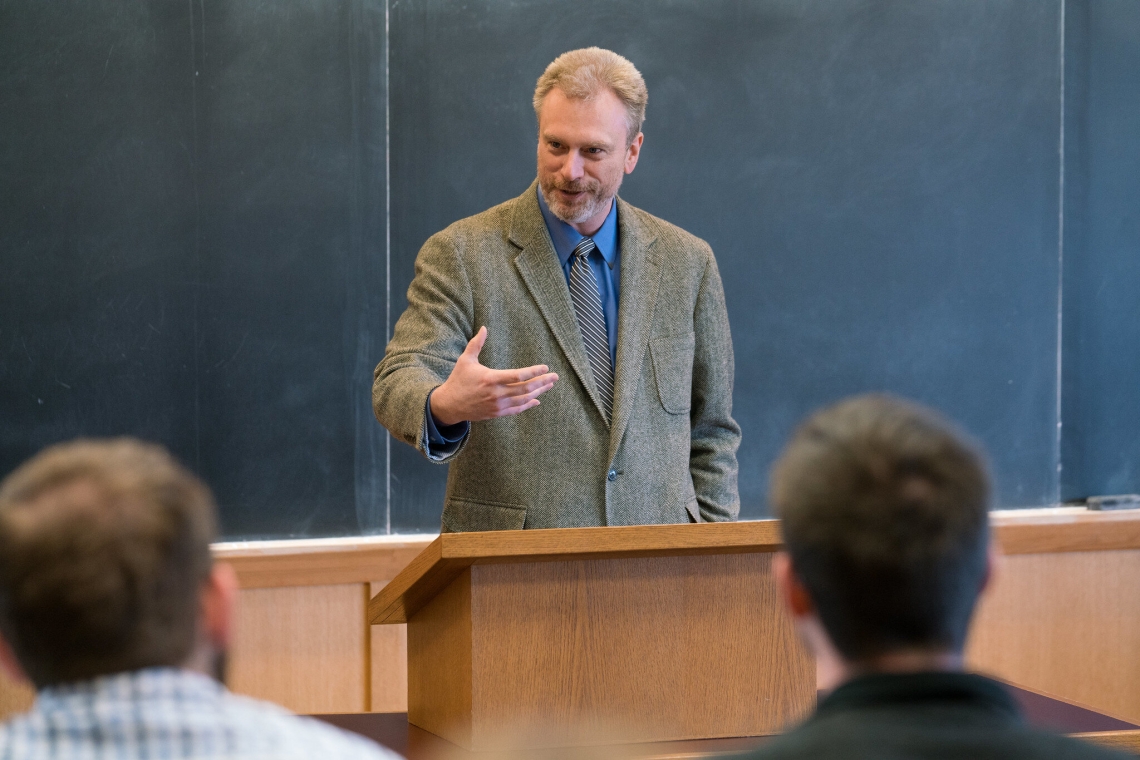
W&L Law Dean Melanie Wilson has announced the appointment of Professor Josh Fairfield as the law school’s inaugural Director of Artificial Intelligence Legal Innovation Strategy. In this role, Fairfield will lead efforts within the law school to create policies, initiatives, and programing to support faculty, staff, and students as AI use grows and evolves.
“We are very fortunate to have someone with Josh’s experience, energy, and vision to lead W&L Law into the future as we capitalize on AI and its impacts on the legal profession,” said Wilson.
Fairfield joined the law school in 2007 and holds the William Donald Bain Family faculty chair. He is an internationally recognized law and technology scholar, specializing in digital property, electronic contracts, big data privacy, and virtual communities. He is the author of two books, “Runaway Technology: Can Law Keep Up?” and “Owned: Property, Privacy and the New Digital Serfdom,” as well as numerous law review articles examining the nexus of law and technology.
Fairfield sees his primary task in this new role as helping the law school and the University more broadly adopt an approach to AI that balances the benefit and the risk of the new technology. He has already hosted two workshops at the law school on artificial intelligence, including one titled “The Last Human Question,” which examined the role AI will play in the development of common law, and “Prompt Engineering for Academics,” which addressed how to use artificial intelligence to accelerate scholarship while avoiding ethical quandaries. A top priority for him will be teaching students what AI is, how it works, and best practices for its use.
“Students need to understand that an AI technology like ChatGPT is not like other legal research tools,” says Fairfield. “When you search for legal documents on Google or Lexus, you can have confidence that it is producing something that courts will recognize as law. But if you ask ChatGPT to find a case where X-Y-Z happens, it will give you that case even if it doesn’t actually exist. And a lawyer who uses such a case in court will get sanctioned, putting their career at risk.”
Fairfield will also work with other campus partners to develop a policy for AI use that can withstand the reflexive desire to ban it for educational purposes, instead infusing the use of these tools with an honorable ethic.
“The use of AI in work product is largely undetectable—even by generative AI itself—so we don’t really have the option to not train our students on this technology,” says Fairfield. “We’re also an institution deeply grounded in principles of honor and the highest aspirations of what it means to be a lawyer—to develop the law to advance human purpose.”
Fairfield notes that fear often accompanies the arrival of new and disruptive technologies, and that in the case of AI, this fear is justified—if misplaced.
“The threat is not that the toasters will rise up against us,” says Fairfield. “The threat is that AI is going to become competent at performing many human tasks but remain indifferent to our welfare.”
As such, Fairfield argues that is essential to engage with the technology in order to manage the social disruption that it will inevitably bring. With respect to the legal profession, Fairfield believes AI will be a booster and accelerator for people who adopt the technology, but it will also cause real problems with how law is created.
“Lawyers create the law with briefs and talking to judges,” says Fairfield. “As lawyers begin to use AI to create briefs and judges use those briefs to write opinions, more and more of what law is will not be created by people, and that is a problem.”
The legal profession has already experienced one major AI revolution with the emergence of E-Discovery software. Document review by armies of new associates that once took months now occurs in a matter of minutes. Even now, companies like Lexus/Nexus and Westlaw are feverishly integrating AI into search technology in order to generate more accurate legal research and analysis. This, in turn, will create additional disruption within the legal profession as firms and other organizations seize on cost savings gained by greater efficiency, says Fairfield.
“Finding the law has always been more than half of our job as lawyers. In the future, our job will be only to evolve the law, which is one thing AI cannot do.”
To understand what this means to future lawyers, Fairfield uses chess as an example. Human chess masters easily defeated the first computer systems, but eventually, computers advanced to the point where they were the better players. Now, teams of humans curating the actions of powerful computing systems have overtaken the purely automated programs because the humans in control can change and evolve the rules of the system in ways the computer programs cannot. Fairfield says the relationship of lawyers to AI in the production of legal work will follow a similar model.
“Our role as lawyers will be to curate the rapid use of the very best cases by intelligent agents so we can make the best argument that we can for our clients,” says Fairfield. “But we must also understand that all AI can do is recreate our normative legal universe. It will be up to humans to make sure that law continues to reflect our actual desires as society evolves.”
If you know any W&L faculty who would be great profile subjects, tell us about them! Nominate them for a web profile.
